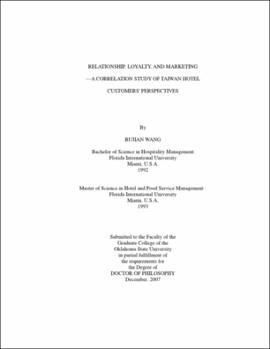| dc.contributor.advisor | Leong, Jerrold K. | |
| dc.contributor.author | Wang, Rujian | |
| dc.date.accessioned | 2013-11-26T08:33:27Z | |
| dc.date.available | 2013-11-26T08:33:27Z | |
| dc.date.issued | 2007-12 | |
| dc.identifier.uri | https://hdl.handle.net/11244/7283 | |
| dc.description.abstract | Scope and Method of Study: The purpose of the study was to validate customer equity theory by relating the marketing drivers to the generation of true customer loyalty among the patrons of a five-star hotel in Taipei, Taiwan. The study was guided by three objectives: (a) to determine the relationship between marketing drivers related to customer equity theory and customer loyalty, (b) to determine the profiles of customers according to the antecedents and behavioral outcomes of customer loyalty, and (c) to determine the association between the customer loyalty and the customer demographic profiles. The survey method would use self-administered questionnaires. A two-stage sampling approach including convenient sampling and systematic random sampling method was conducted. Paired samples t-test, regression analysis, cluster analysis, multiple variances of analysis in connected with discriminate analysis, one way of variance analysis, and important-performance analysis (IPA) were employed in the data analysis. | |
| dc.description.abstract | Findings and Conclusions: The findings of empirical tests supported the conclusion that fundamental and marketing strategies related to customer equity theory increased attitudinal and behavioral loyalty. There was no linear relationship on proportion of stay from the fundamental marketing strategy and the progressive marketing strategy. Customers in the hotel could be classified in terms of attitudinal loyalty (trust, commitment, and switching cost) and behavioral loyalty (word-of-mouth endorsement, cooperation, and proportion of visit) into four segments of customer loyalty: latent (27.5%), true (48.8%), low (19.1%), and spurious (4.6%). The customers' demographic variables could not be associated with the segments of customer loyalty, attitudinal loyalty and behavioral loyalty. The managerial implication is that profiling customer developed the marketing strategies that further influence the shifts of the segments of markets. The theoretical implications indicated that the empirical results was not completely supported by customer equity theory and might be an example of dissonance theory. | |
| dc.format | application/pdf | |
| dc.language | en_US | |
| dc.rights | Copyright is held by the author who has granted the Oklahoma State University Library the non-exclusive right to share this material in its institutional repository. Contact Digital Library Services at lib-dls@okstate.edu or 405-744-9161 for the permission policy on the use, reproduction or distribution of this material. | |
| dc.title | Relationship, loyalty, and marketing - A correlation study of Taiwan hotel customers' perspectives | |
| dc.contributor.committeeMember | Warde, William D. | |
| dc.contributor.committeeMember | Palakurthi, Radesh | |
| dc.contributor.committeeMember | Dunn, Gregory E. | |
| osu.filename | Wang_okstate_0664D_2500.pdf | |
| osu.accesstype | Open Access | |
| dc.type.genre | Dissertation | |
| dc.type.material | Text | |
| dc.subject.keywords | customer loyalty | |
| dc.subject.keywords | customer equity | |
| dc.subject.keywords | cognitive dissonance | |
| dc.subject.keywords | attitudinal loyalty | |
| dc.subject.keywords | behavioral loyalty | |
| dc.subject.keywords | trust | |
| thesis.degree.discipline | Hotel and Restaurant Administration | |
| thesis.degree.grantor | Oklahoma State University | |
